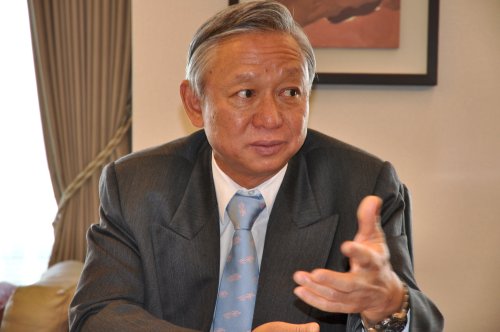A top-ranking Hong Kong security official sought advice from Korean experts on nuclear disaster contingency plans while visiting here last week.
Hong Kong Security Secretary Ambrose Lee also called for an international convention to tackle cyber crime across borders during his fifth official trip to meet Korean ministers.
Lee met Korean Chairman of the Nuclear Safety and Security Commission Kang Chang-sun to seek advice on disaster contingency plans in the light of the March 11 Fukushima meltdown that continues to blight Japan.
“He is an expert in this field,” Lee said on Wednesday.
“I asked him if we should expand the nuclear evacuation zone and what other precautions we should take.”
Although there are no nuclear reactors in the administrative region of Hong Kong, China’s Daya Bay Nuclear Power Plant is just 50 kilometers away from the city center.
“We do not have any fear but we are obviously concerned after the Fukushima accident, so in Hong Kong now we are actively reviewing our contingency plan in case any mishap happened in Daya Bay,” Lee said.
Hong Kong Security Secretary Ambrose Lee also called for an international convention to tackle cyber crime across borders during his fifth official trip to meet Korean ministers.
Lee met Korean Chairman of the Nuclear Safety and Security Commission Kang Chang-sun to seek advice on disaster contingency plans in the light of the March 11 Fukushima meltdown that continues to blight Japan.
“He is an expert in this field,” Lee said on Wednesday.
“I asked him if we should expand the nuclear evacuation zone and what other precautions we should take.”
Although there are no nuclear reactors in the administrative region of Hong Kong, China’s Daya Bay Nuclear Power Plant is just 50 kilometers away from the city center.
“We do not have any fear but we are obviously concerned after the Fukushima accident, so in Hong Kong now we are actively reviewing our contingency plan in case any mishap happened in Daya Bay,” Lee said.

Hong Kong authorities are seeking advice from Korea and other countries and will conduct a territory-wide exercise early in 2012.
“That will involve maybe an actual exercise with the evacuation of people within 20 kilometers of the nuclear plant,” he said.
Lee also discussed Kang’s opinion on the safety of nuclear energy.
“He is of the opinion that in this respect nuclear power is more environmental than using fossil fuels. He is of the opinion that by far nuclear power is safe. I agree with him.”
Lee also met the Commissioner General of the Korean National Police Agency Cho Hyun-oh during his trip as well as Korean heads of immigration and emergency management.
He said: “In these days with the ease of travel and the frequent movement of people, the advances in technology, the Internet, criminals don’t respect national borders. It requires the cooperation and mutual trust of law enforcers in every part of the world.”
He called for the international community to establish an international convention requiring signatories to that convention to cooperate to tackle online offences.
“Tackling cyber crime requires cooperation and mutual trust of different law enforcement agencies around the world,” he said.
“To discover an illegal activity is easy but to trace the instigator is very difficult. These days with cyber fraud you can identify a plot and you can educate the public that this is a false site but how to trace the origin is difficult, maybe he is from some country in Africa.”
He said that although there were already some cross-border agreements in place: “with the advancement of technology we have to keep pace with the criminals otherwise they will be far ahead of us.”
The Korean police force already has liaison officers stationed in Hong Kong to tackle the issue with “cases of good cooperation between the two sides,” according to Lee.
The security secretary also promoted intelligence-sharing to tackle terrorism and the proliferation of weapons of mass destruction.
“We raised some matters of common concern,” he said. “We also agreed that there is plenty of room for sharing experience and we also agreed that people exchanging at a very senior level is very important in building up mutual trust and promoting future cooperation.”
Last year, more than 1 million Koreans visited Hong Kong and hundreds of thousands of the region’s residents visited Korea.
And Lee said it was important to balance Hong Kong’s lenient visa laws aimed at attracting tourists and highly-skilled professionals with security concerns.
“There are a number of cases of Hong Kong people committing offenses (in Korea) or vice versa so those are common concerns,” he said.
“On one hand we have to assure the safety and security of our tourists, on the other hand we do not want any criminals taking the opportunity to commit crimes in the other side’s jurisdiction.”
By Kirsty Taylor (kirstyt@heraldcorp.com)
-
Articles by Korea Herald







![[From the Scene] Monks, Buddhists hail return of remains of Buddhas](http://res.heraldm.com/phpwas/restmb_idxmake.php?idx=644&simg=/content/image/2024/04/19/20240419050617_0.jpg&u=20240419175937)








![[From the Scene] Monks, Buddhists hail return of remains of Buddhas](http://res.heraldm.com/phpwas/restmb_idxmake.php?idx=652&simg=/content/image/2024/04/19/20240419050617_0.jpg&u=20240419175937)

![[KH Explains] Hyundai's full hybrid edge to pay off amid slow transition to pure EVs](http://res.heraldm.com/phpwas/restmb_idxmake.php?idx=652&simg=/content/image/2024/04/18/20240418050645_0.jpg&u=20240419100350)

![[Today’s K-pop] Illit drops debut single remix](http://res.heraldm.com/phpwas/restmb_idxmake.php?idx=642&simg=/content/image/2024/04/19/20240419050612_0.jpg&u=)